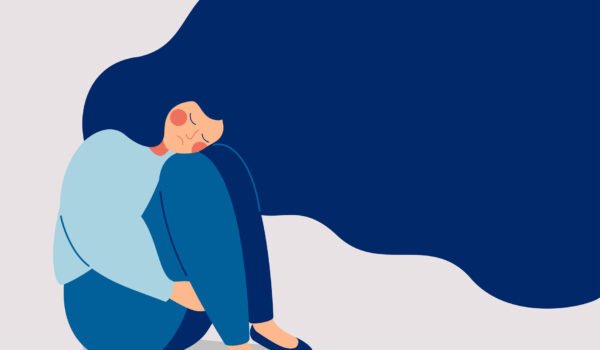Depression and Persistent Depressive disorder/ Major depressive disorder
Keywords: Melancholy, Unhappiness, Sadness, The blues, Dysthymia, Dejection, Suicidal thoughts, Mood Disorder, Affective Disorders, Low mood.
Feeling sad, loss of interest and lack of pleasure in daily activities for a short period is common for all of us. If this symptom persists for a longer time, they land into Depressive Disorder, also called depression. With a global number of 264 million people suffering from depression, it is among the most common psychiatric disorders.
And in the World suffering from post-Covid -19 shock, depressive disorders have increased manifold times.
Hormonal changes in women, particularly during puberty, before menstruation, following pregnancy, at perimenopause and differing psychosocial stressors trigger depression in females. And thus female gender suffers almost twice that of men.

What are the contributing factors for depression?
The exact cause of MDD is not known. It results from a complex interaction between social, psychological and biological factors.
Changes in the brain’s neurotransmitter levels, adverse life events (Bereavement, unemployment, problem in relationships, early childhood trauma), family history of having a psychiatric disorder, chronic illness, drug usage are a few of the precipitating factors that contribute to causing depression. Stress, anxiety often coexists with neurotic depression.
Prolonged usage of certain medicinal drugs may also precipitate depression.
How do you identify depressive disorders?
Minor depressive episodes are common and normal to everyone. Still, if the following symptoms are experienced daily or repeatedly for an extended period- you may need medical help.
1) A depressed or irritable mood almost every day.
2) Diminished interest or pleasure in most of the activities regularly.
3) Significant weight loss or weight gain with either high or feeble appetite
4) Increased or decreased sleep nearly every day.
5) Marked change in activity, i.e., may be increased or decreased.
6) Fatigue or less energy nearly every day.
7) Feelings of worthlessness or inappropriate guilt nearly every day.
8) Decreased concentration, indecisiveness nearly every day.
9) Recurrent thoughts of death, recurrent suicidal ideation.
The person is suffering from the clinical depressive disorder if about five or more of the symptoms mentioned above have been present during the same two-week period. In that case, the symptoms can cause significant distress or impairment in social, occupational, or other important areas of functioning.
From a psychiatric aspect to evaluate depression, there are various scales, which are frequently being used. Different rating scales like The Beck Depression Inventory (BDI), The Center for Epidemiologic Studies Depression Scale (CES-D), The EQ-5D scale, The Hamilton Rating Scale for Depression, Montgomery-Åsberg Depression Rating Scale (MADRS), etc., are frequently used to understand the grade, prognosis, line of management and disease progress.
What is the difference between Major Depressive Disorder and Persistent Depressive Disorder (or dysthymia)?
Diagnosis of Persistent Depressive disorder(PDD) or dysthymia – is made when the person experiences clinically significant depression for an extended period, about two or more years. Whereas for diagnosing MDD, Symptoms should persist for at least two weeks only.
One more significant difference between MDD and PDD is their relation with time-
People diagnosed with MDD have a usual mood when they are not experiencing depression. People with PDD experience persistent depression, incapable of having any fun, even in a socially happy situation. And they feel that sadness or other depressive symptoms as part of their life. Dysthymic people sometimes present with excessive irritability to mask their socially hopeless condition.
What to do? When to seek medical help?
Clinical depression is not just a down feeling or being unhappy for some days. However, it is a common phenomenon that people suffering from depression think that their mental condition is just a state of mind and not a genuine health problem, for which they should seek medical help. But they are often mistaken – it is a disease with real symptoms. And seeking help for a mental condition is not taboo, neither it is a matter to hide.
In the case of diagnosed or undiagnosed depression, the worst possible outcome would be suicide. In most cases, suicidal thoughts come as an impulse. Research has shown medicinal therapy with Behavioural activation, Cognitive behavioural therapy, Interpersonal psychotherapy given by professional psychologists will be helpful.
What is the role of Homoeopathy?
At Let’s Homoeopathy, our doctors discuss the detailed history and suffering of the patient. After that, he analyses and decides to prescribe the necessary medication with appropriate potency and dosages and proper line of treatment. They would also give basic counselling on the fundamental aspects of the condition. In some cases, the doctor may suggest professional psychologists’ consultation. And all these can happen from the comfort of your home, assuring the privacy and confidentiality of the patient.
Though the results may vary depending on various aspects of the individual’s condition, Homoeopathic remedies treat depressive disorders effectively.
Some of the frequently used medications are – Natrum Muriaticum, Aurum Met, Lachesis, Pulsatilla, Arsenicum Album, Lycopodium, Phosphorus, Sulphur, Nux vomica, Sepia etc. We don’t encourage patients to experiment with homoeopathic medications. Self-prescription can prove harmful, and parents are not encouraged to self-prescribe any of the Homeopathic medicines without consulting an appropriately qualified doctor from a recognized university.
Let our team of Let’s homoeopathy help you fight this disease. We should remember that we should not be shy about mental illnesses – these just like any other medical problem.
So, do not hesitate and waste more time! Get a consultation with a qualified and experienced Homeopath today from the comfort of your home through Let’s Homeopathy. We will deliver the medicines to your doorstep too!